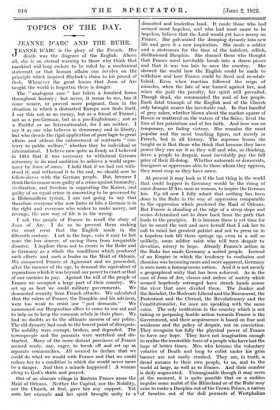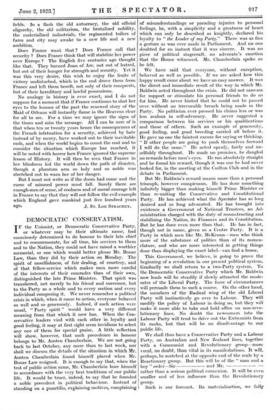TOPICS OF THE DAY.
JEANNE D'ARC AND THE RUHR.
JEANNE D'ARC is the glory of the French. Her death was the disgrace of the English. Above all, she is an eternal warning to those who think that mankind will long endure to be ruled by a mechanical statecraft or that human affairs can revolve on the principle which inspired Shylock's claim to his pound of flesh. Whenever the great lesson that Joan of Arc taught the world is forgotten there is danger.
The " analogous case " has taken a hundred forms throughout history ; but never, it seems to me, has it come nearer, or proved more poignant, than in the situation in which a distracted Europe now finds itself. I say this not as an enemy, but as a friend of France ; not as a pro-German, but as a pro-Englishman ; not as a Pacifist or an Internationalist, for I am neither. I say it as one who believes in democracy and in liberty, but who dreads the rigid application of pure logic to great affairs and abhors the enforcement of contracts " con- trary to public welfare," whether they be individual or international. I believe now quite as firmly as I believed in 1914 that it was necessary to withstand German autocracy in its mad ambition to achieve a world supre- macy by force of arms. I hold that if we had not with- stood it, and withstood it to the end, we should now be fellow-slaves with the German people. But, because I think the Germans were guilty of a crime against humanity, civilization, and freedom in supporting the Kaiser, and guilty of an equal crime in consenting to be governed by a Hohenzollern tyrant, I .am -not going to say that therefore everyone who now hates or hits a German is in the right and everyone who wishes to make mercy, not revenge, the new way of life is 'in the wrong.
I ask the people of France to recall the story of Joan of Arc. I do so to prevent them making the cruel error that the English made in the fifteenth century. I act in the hope, vain it may be but none the- less sincere, of saving them from irreparable disaster. I implore them not to create in the Ruhr and in Germany as a whole the conditions which produced such effects and such a leader as the Maid of Orleans. We conquered France. at Agincourt and we proceeded, after the manner of the age, to demand the equivalent of reparations which it was beyond our power to exact or that of our enemies to pay. Against the will of the people of France we occupied a large part of their country. We set up as best we could military governments. We demanded security from French attacks. We calculated that the rulers of France, the Dauphin and his advisers, were too weak to resist our " just demands." We summoned our Burgundian allies to come to our aid and to help us to keep the common rebels in their place. We had no doubts as to the ultimate success of our policy. The old dynasty had sunk to the lowest point of disrepute. The nobility were corrupt, broken, and degraded. The townspeople and the peasants were wretched and dis- tracted. Many of the more distant provinces of France seemed ready, nay, eager, to break off and set up as separate communities. All seemed to declare that we could do what we would with France and that we could reduce her to a condition in which she would never more be a danger. And then a miracle happened I A woman clung to God's skirts and prayed.
Out of an obscure 'village in Eastern France arose the Maid of Orleans. Neither the Capital, nor the Nobility, nor the Church, at first, gave her any support. Yet soon her example and her spirit brought unity to a disunited and leaderless land. It made those who had seemed most hopeless, and who had most cause to be hopeless, believe that the Lord would yet have mercy on France. She galvanized the drooping dynasty into new life and gave it a new inspiration. She made a soldier and a statesman for the time of the indolent, selfish, disillusioned Dauphin. She shamed those who thought that. France must inevitably break into a dozen pieces and that it was too late to save the country. She showed the world how the English could be made to withdraw and how France could be freed and re-estab- lished. Even when reaction followed the reign of miracles, when the fate of war turned against her, and when she paid the penalty, her spirit still prevailed. Though dead, she commanded the soul of her people. Each fatal triumph of the English and of the Church only brought nearer the inevitable end. In that handful of grey ashes, whether blown about the market square of Rouen or scattered on the waters of the Seine, lived the fires of her patriotism and of her faith. And hers was no temporary, no fading victory. She remains the most popular and the most touching figure, not merely in French, but in all history. The supreme lesson she taught us is that those who think that because they have power they can use it as they will and who, so thinking, drive a people to despair, must inevitably pay the full price of their ill-doing. Whether autocrats or democrats, foreigners or oppressors akin to those whom they oppress, they must reap as they have sown.
At present it may look as if the last thing in the world that could happen in Germany would be the rising of some Jeanne D'Arc, man or woman, to inspire the German kin. Up till now I fully admit that nothing has been done in the Ruhr in the way of oppression comparable to the oppression which produced the Maid of Orleans. But France is standing at the edge of a steep slope and seems determined not to draw back from the path that leads to the precipice. It is because there is yet time for her to count 'the cost and save herself that I ask her to call to mind her greatest patriot and not to press on in a hopeless task till there springs up, even in a soil so unlikely, some soldier saint who will turn despair to devotion, misery to hope. Already France's action in the Ruhr has made Germany a united people. Instead of an Empire in which the tendency to confusion and disunion was becoming more and more apparent, Germany is once more a homogeneous nation. And it is not merely a geographical unity that has been achieved. As in the case of Joan of Arc, classes and orders of society which seemed hopelessly estranged have struck hands across the river that once divided them. The Junker and the Socialist, the Moderate Liberal and the Bureaucrat, the Protestant and the Clerical, the Revolutionary and the Constitutionalist, for once are speaking with the same voice. The only institution in the country which is not taking or purposing hostile action towards France is the Government, and their acquiescence is based on fear and weakness and the policy of despair, not on conviction. They recognize too fully the physical power of France to have any hope. They have not imagination enough to realize the irresistible force of a people who have lost the hope of better times. Men who become the voluntary votaries of Death and long to enlist under his grim banner are not easily crushed. They are, in truth, a dread menace to their own people, to us, and to the world at large, as well as to France. And their number is daily augmented. Unimaginable though it may seem at the moment, it is quite possible that on a sudden impulse some zealot of the Rhineland or of the Ruhr may arise to make a Dauphin out of the Crown Prince, a nation of fanatics out of the dull peasants of Westphalian fields. - In a flash the Old autocracy, the old- official oligarchy, the old militarism, the brutalized nobility, the materialized industrials; the regimented toilers of f arm and city may awake to a new life and a new ambition. • Does France want that ? Does France call that security ? Does France think that will stabilize her power over Europe ? The English five centuries ago thought like that. They burned Joan of Arc, not out of hatred, but out of their hunger for strength and security. Yet it was this very desire, this wish to enjoy the fruits of victory undisturbed, which in the end drove them from France and left them bereft, not only of their conquests, but of their hereditary and lawful possessions.
No analogy in history is ever exact, and I do not suppose for a moment that if France continues to shut her eyes to the lessons of the past the renewed story of the Maid of Orleans will instantly flame in the Heavens clear for all to see. For a time we may ignore the signs of the times and miss the message. All I can be sure of is that when ten or twenty years hence the consequences of the French infatuation for a security, achieved by hate instead of by mercy, have worked out to their inevitable ends, and when the world begins to count the cost and to consider the situation which Europe has reached, it will be noted with horror how France ignored the supreme lesson of History. It will then be seen that France in her blindness led the world down the path of disaster, though a phantom arm so holy and so noble was stretched out to warn her of her danger.
But I must not write as if the doom had come and the curse of misused power must fall. Surely there are enough men of sense, of coolness and of moral courage left in France to say that they will not follow the evil example which England gave mankind just five hundred years











































 Previous page
Previous page